外研版六年级下册英语第三单元课文笔记
六下英语第三单元知识点
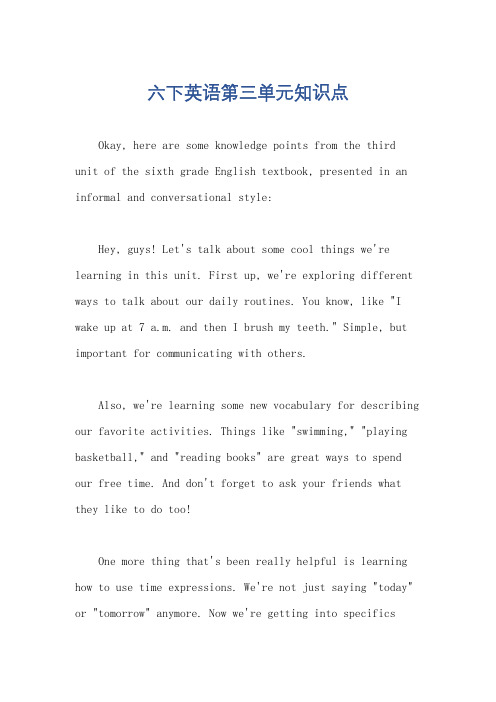
六下英语第三单元知识点Okay, here are some knowledge points from the thirdunit of the sixth grade English textbook, presented in an informal and conversational style:Hey, guys! Let's talk about some cool things we're learning in this unit. First up, we're exploring different ways to talk about our daily routines. You know, like "I wake up at 7 a.m. and then I brush my teeth." Simple, but important for communicating with others.Also, we're learning some new vocabulary for describing our favorite activities. Things like "swimming," "playing basketball," and "reading books" are great ways to spend our free time. And don't forget to ask your friends what they like to do too!One more thing that's been really helpful is learning how to use time expressions. We're not just saying "today" or "tomorrow" anymore. Now we're getting into specificslike "next week" or "in two days." It's like we're planning our lives with precision!Oh, and don't forget about the weather. We'repracticing how to describe different types of weather in English. Whether it's sunny, rainy, or snowy, we're ready to talk about it. After all, the weather is always a great topic for conversation.Lastly, we're learning how to express our feelings and emotions in English. It's not just about saying "I'm happy" or "I'm sad." We're diving deeper into things like "I'm excited about the trip" or "I'm nervous about the test.。
外研版(三起)小学英语六年级下册Module 3知识点汇总
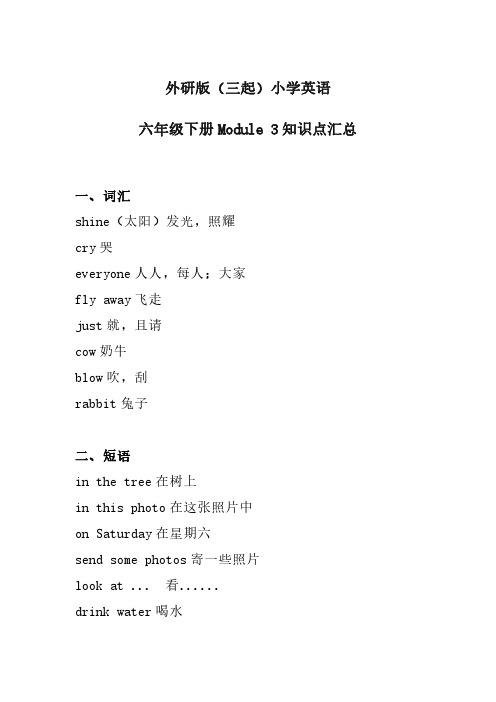
外研版(三起)小学英语六年级下册Module3知识点汇总一、词汇shine(太阳)发光,照耀cry哭everyone人人,每人;大家fly away飞走just就,且请cow奶牛blow吹,刮rabbit兔子二、短语in the tree在树上in this photo在这张照片中on Saturday在星期六send some photos寄一些照片look at...看......drink water喝水三、句子1.Please write to me soon.请尽快给我写信。
2.I had a very interesting day on Saturday.星期六我度过了有趣的一天。
3.The birds are singing in the tree.鸟在树上唱歌。
4.In this photo,it’s starting to rain and birds are flying away.在这张照片中,开始下雨了,鸟飞走了。
5.—What are you doing?你正在做什么?—I’m cleaning my room.我正在打扫我的房间。
6.We are having a lovely time!我们度过了快乐的一天!四、句型结构询问你正在做什么—What are you doing?—I’m+动词-ing+其他.eg:—What are you doing?你正在做什么?—I’m listen to music.我正在听音乐。
—What are you doing?你正在做什么?—I’m sweeping the floor.我正在扫地。
六年级下册英语Unit 3单元知识梳理(1)

六年级下册单元知识点第三单元四会单词:watch—watched 看wash—washed 洗clean—cleaned 打扫play—played玩visit—visited 看望do—did last weekend上一个周末go—went去go to a park—went to a park 去公园go swimming—went swimming 去游泳go fishing—went fishing去钓鱼read—read 读go hiking—went hiking 去郊游四会句型:What did you do last weekend? 你上个周末干什么了?I played football. 我踢足球了。
Did you read books? 你读书了吗?Yes, I did.是的,我读了。
No, I didn’t. 不,我没有。
应该掌握的知识点:1、关于一般过去时一般过去时态:表示过去某一时间所发生的动作或存在的状态。
谓语动词要用一般过去式。
经常与yesterday(昨天), last week(上周), last month(上个月), last year(去年), two months ago(两个月前), the day before yesterday(前天),in 1990 (在1990年), in those days (在那些日子里)等表示过去的时间状语连用。
如:I was born in 1990. (我出生在1990年)。
When did you go to the park? (你是什么时候去的公园)。
I went to the park last week. (我是上周去的公园)在上面的句子中第一句属于be动词的一般过去时态;第二句和第三句属于实义动词的一般过去时态。
(1)Be 动词的一般过去时态在没有实义动词的句子中使用be动词,am is 的过去式为was; are 的过去式为were.构成:肯定句:主语+was (were) +宾语如:I was late yesterday. (昨天我迟到了。
外研社小学英语六年级unit3知识点归纳
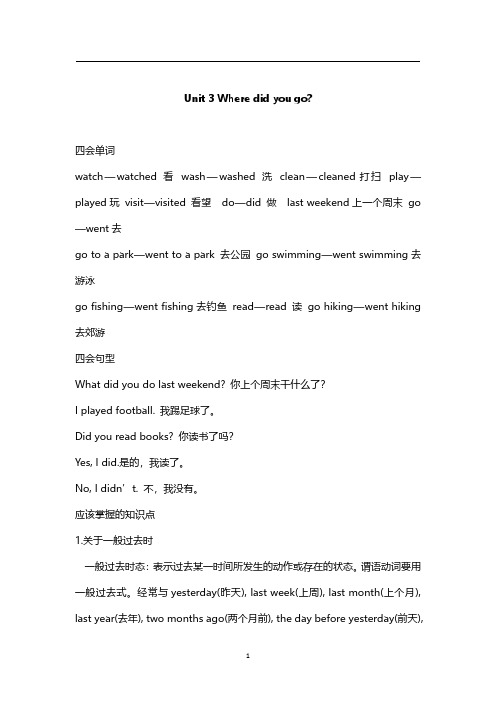
Unit3Where did you go?四会单词watch—watched看wash—washed洗clean—cleaned打扫play—played玩visit—visited看望do—did做last weekend上一个周末go —went去go to a park—went to a park去公园go swimming—went swimming去游泳go fishing—went fishing去钓鱼read—read读go hiking—went hiking 去郊游四会句型What did you do last weekend?你上个周末干什么了?I played football.我踢足球了。
Did you read books?你读书了吗?Yes,I did.是的,我读了。
No,I didn’t.不,我没有。
应该掌握的知识点1.关于一般过去时一般过去时态:表示过去某一时间所发生的动作或存在的状态。
谓语动词要用一般过去式。
经常与yesterday(昨天),last week(上周),last month(上个月), last year(去年),two months ago(两个月前),the day before yesterday(前天),in1990(在1990年),in those days(在那些日子里)等表示过去的时间状语连用。
如:I was born in1990.(我出生在1990年)。
When did you go to the park?(你是什么时候去的公园)。
I went to the park last week.(我是上周去的公园)在上面的句子中第一句属于be动词的一般过去时态;第二句和第三句属于实义动词的一般过去时态。
(1)be动词的一般过去时态在没有实义动词的句子中使用be动词,am is的过去式为was;are的过去式为were.构成:肯定句:主语+was(were)+宾语如:I was late yesterday.(昨天我迟到了。
六年级英语下册第三单元知识点和课文翻译
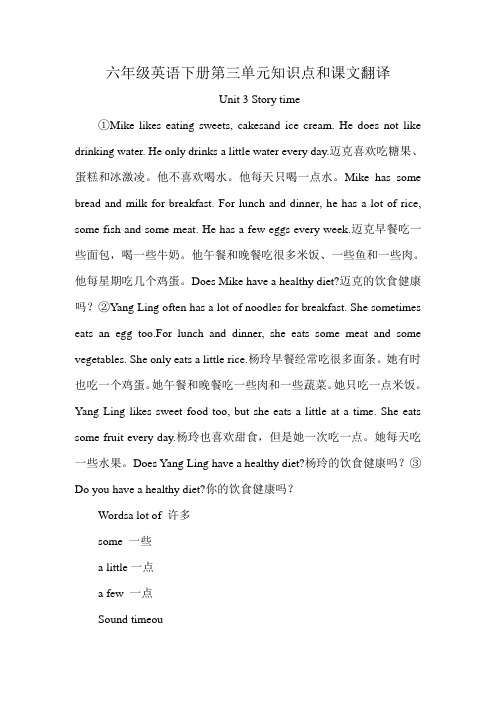
六年级英语下册第三单元知识点和课文翻译Unit 3 Story time①Mike likes eating sweets, cakesand ice cream. He does not like drinking water. He only drinks a little water every day.迈克喜欢吃糖果、蛋糕和冰激凌。
他不喜欢喝水。
他每天只喝一点水。
Mike has some bread and milk for breakfast. For lunch and dinner, he has a lot of rice, some fish and some meat. He has a few eggs every week.迈克早餐吃一些面包,喝一些牛奶。
他午餐和晚餐吃很多米饭、一些鱼和一些肉。
他每星期吃几个鸡蛋。
Does Mike have a healthy diet?迈克的饮食健康吗?②Yang Ling often has a lot of noodles for breakfast. She sometimes eats an egg too.For lunch and dinner, she eats some meat and some vegetables. She only eats a little rice.杨玲早餐经常吃很多面条。
她有时也吃一个鸡蛋。
她午餐和晚餐吃一些肉和一些蔬菜。
她只吃一点米饭。
Yang Ling likes sweet food too, but she eats a little at a time. She eats some fruit every day.杨玲也喜欢甜食,但是她一次吃一点。
她每天吃一些水果。
Does Yang Ling have a healthy diet?杨玲的饮食健康吗?③Do you have a healthy diet?你的饮食健康吗?Wordsa lot of 许多some 一些a little 一点a few 一点Sound timeouabout 大约house 房子mouth 嘴巴out 出去shout 喊,叫Mrs Li shouts, 李太太大声喊,“Get out! Get out!”滚!滚!There’s a little mouse 有一只小老鼠。
六年级下册英语外研版m2课堂笔记
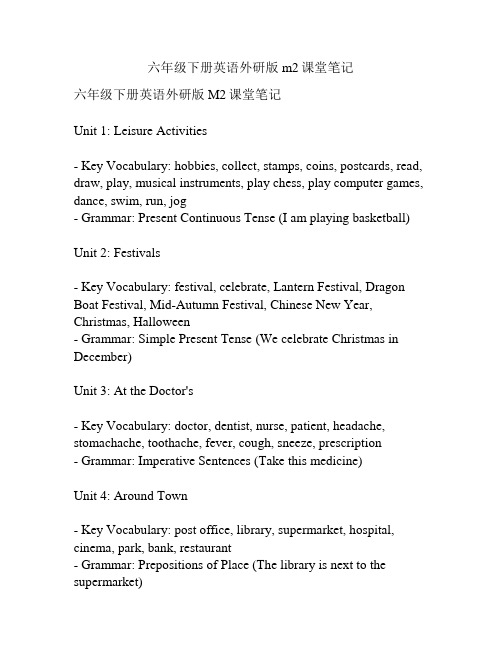
六年级下册英语外研版m2课堂笔记六年级下册英语外研版M2课堂笔记Unit 1: Leisure Activities- Key Vocabulary: hobbies, collect, stamps, coins, postcards, read, draw, play, musical instruments, play chess, play computer games, dance, swim, run, jog- Grammar: Present Continuous Tense (I am playing basketball) Unit 2: Festivals- Key Vocabulary: festival, celebrate, Lantern Festival, Dragon Boat Festival, Mid-Autumn Festival, Chinese New Year, Christmas, Halloween- Grammar: Simple Present Tense (We celebrate Christmas in December)Unit 3: At the Doctor's- Key Vocabulary: doctor, dentist, nurse, patient, headache, stomachache, toothache, fever, cough, sneeze, prescription- Grammar: Imperative Sentences (Take this medicine)Unit 4: Around Town- Key Vocabulary: post office, library, supermarket, hospital, cinema, park, bank, restaurant- Grammar: Prepositions of Place (The library is next to the supermarket)Unit 5: Inventions and Innovations- Key Vocabulary: invention, telephone, computer, internet, printer, television, camera, car, airplane- Grammar: Past Tense (Thomas Edison invented the telephone) Unit 6: Environmental Protection- Key Vocabulary: environment, pollution, recycle, save, conserve, waste, energy, water, garbage- Grammar: Modal Verbs (We should recycle paper)Unit 7: Story Time- Key Vocabulary: story, character, plot, setting, narrator, fairy tale, fable- Grammar: Past Continuous Tense (He was reading a book when the phone rang)Unit 8: Sports- Key Vocabulary: basketball, football, tennis, volleyball, swimming, gymnastics, skating, cycling- Grammar: Comparatives (Basketball is more popular than tennis) Unit 9: World Geography- Key Vocabulary: continent, country, capital, landmark, population- Grammar: Present Perfect Tense (I have visited London)Unit 10: Jobs- Key Vocabulary: job, doctor, teacher, engineer, chef, firefighter, police officer, pilot- Grammar: Future Tense (I will be a doctor in the future) These are the main points and vocabulary covered in the M2 textbook of the Grade 6 English course.。
六年级下册英语外研版课堂笔记
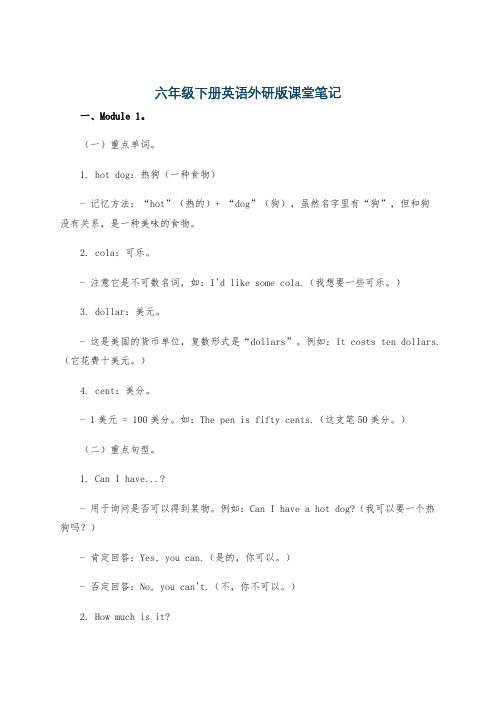
六年级下册英语外研版课堂笔记一、Module 1。
(一)重点单词。
1. hot dog:热狗(一种食物)- 记忆方法:“hot”(热的)+ “dog”(狗),虽然名字里有“狗”,但和狗没有关系,是一种美味的食物。
2. cola:可乐。
- 注意它是不可数名词,如:I'd like some cola.(我想要一些可乐。
)3. dollar:美元。
- 这是美国的货币单位,复数形式是“dollars”。
例如:It costs ten dollars.(它花费十美元。
)4. cent:美分。
- 1美元 = 100美分。
如:The pen is fifty cents.(这支笔50美分。
)(二)重点句型。
1. Can I have...?- 用于询问是否可以得到某物。
例如:Can I have a hot dog?(我可以要一个热狗吗?)- 肯定回答:Yes, you can.(是的,你可以。
)- 否定回答:No, you can't.(不,你不可以。
)2. How much is it?- 用来询问物品的价格。
例如:How much is the cola?(可乐多少钱?)- 回答:It's...(它是……),后面可以接具体的价格,如:It's three dollars.(它是三美元。
)二、Module 2。
(一)重点单词。
1. duck:鸭子。
- 复数形式是“ducks”。
可以说:There are some ducks in the pond.(池塘里有一些鸭子。
)2. noisy:吵闹的。
- 形容词,用来形容环境或声音很吵闹。
例如:The market is noisy.(市场很吵闹。
)3. peace:和平;太平。
- 例如:We all hope for world peace.(我们都希望世界和平。
)4. wide:宽的。
- 反义词是“narrow”(窄的)。
外研版六年级英语下册M3知识点
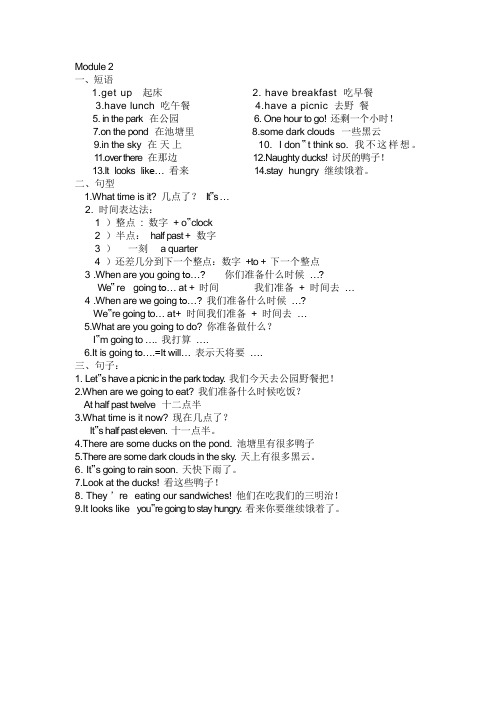
Module 2一、短语1.get up 起床2. have breakfast 吃早餐3.have lunch 吃午餐4.have a picnic 去野餐5. in the park 在公园6. One hour to go! 还剩一个小时!7.on the pond 在池塘里8.some dark clouds 一些黑云9.in the sky 在天上10. I don‟t think so. 我不这样想。
11.over there 在那边12.Naughty ducks! 讨厌的鸭子!13.It looks l ike… 看来14.stay hungry 继续饿着。
二、句型1.What time is it? 几点了?It‟s …2. 时间表达法:1 )整点: 数字+ o‟clock2 )半点:half past + 数字3 )一刻 a quarter4 )还差几分到下一个整点:数字+to + 下一个整点3 .When are you going to…? 你们准备什么时候…?W e‟ re going to… at + 时间我们准备+ 时间去…4 .When are we going to…? 我们准备什么时候…?We‟re going to… at+ 时间我们准备+ 时间去…5.What are you going to do? 你准备做什么?I‟m going to …. 我打算….6.It is going to….=It will… 表示天将要….三、句子:1. Let‟s have a picnic in the park today. 我们今天去公园野餐把!2.When are we going to eat? 我们准备什么时候吃饭?At half past twelve 十二点半3.What time is it now? 现在几点了?It‟s half past eleven. 十一点半。
六年级下册英语外研版课堂笔记

六年级下册英语外研版课堂笔记全文共3篇示例,供读者参考篇1Classroom Notes for Grade 6 English (Second Semester, Foreign Edition)Lesson 1: Family MattersIn this lesson, we learned about family relationships and vocabulary related to family members. We discussed the importance of family bonding and the different roles each family member plays. We also practiced using possessive pronouns to show ownership of family members.Lesson 2: A Trip to the ZooDuring this lesson, we talked about animals and their habitats. We learned new vocabulary related to different animal species and their characteristics. We also discussed the importance of wildlife conservation and how we can protect endangered species.Lesson 3: My Dream VacationIn this lesson, we shared our dream vacation destinations and talked about the activities we would like to do there. We practiced using future tense to express our plans and wishes for the future. We also learned about different types of vacations such as beach holidays, city tours, and adventure trips.Lesson 4: The Science Fair ProjectDuring this lesson, we worked on our science fair projects and presented our findings to the class. We discussed the scientific method and how to conduct experiments in a systematic way. We also learned about different branches of science and the importance of experimentation in the field.Lesson 5: Global CitizenshipIn this lesson, we talked about global issues such as poverty, pollution, and climate change. We discussed the concept of global citizenship and how we can make a positive impact on the world. We also learned about sustainable development goals and how we can contribute to a better future for all.Overall, this semester has been full of engaging and insightful lessons that have broadened our knowledge and understanding of the world around us. We look forward toapplying what we have learned in our daily lives and becoming responsible global citizens.篇2Class Notes - English Grade 6 Volume 2 Foreign EditionUnit 1: Who's the best singer?In this unit, we learned how to compare the singing abilities of different singers using comparative and superlative forms of adjectives. We also practiced using different expressions to show preferences and opinions. For example:- I think Taylor Swift sings better than Katy Perry.- Ariana Grande is the best singer in the world!We also practiced using the expressions "better than" and "the best" to compare different singers. It was a fun and interactive way to improve our vocabulary and grammar skills.Unit 2: What are you going to do this weekend?In this unit, we learned how to talk about our weekend plans using the future tense. We also practiced using the present continuous tense to talk about future arrangements. For example:- I'm going to watch a movie this weekend.- We're visiting our grandparents on Saturday.We also learned how to use expressions like "going to," "will," and "plan to" to talk about future events. It was a great way to practice using different verb tenses in conversation.Unit 3: How was the trip to the museum?In this unit, we learned how to talk about past experiences using the past simple tense. We also practiced using expressions to describe different aspects of a trip to the museum. For example:- The trip to the museum was amazing!- I learned a lot of new things about history.We also practiced using regular and irregular verbs in the past simple tense to talk about our experiences. It was a fun and educational way to improve our storytelling skills.Unit 4: What's your favorite food?In this unit, we learned how to talk about our favorite foods using adjectives to describe taste and texture. We also practiced using expressions to talk about likes and dislikes. For example:- I love pizza because it's delicious and cheesy.- I hate brussels sprouts because they're bitter and mushy.We also learned how to use expressions like "love," "like," "hate," and "prefer" to talk about our preferences. It was a tasty way to practice using descriptive language in conversation.Unit 5: How do you get to school?In this unit, we learned how to talk about different modes of transportation using prepositions of movement. We also practiced using expressions to describe our daily routines and journeys. For example:- I walk to school every day.- My mom drives me to school in the car.We also practiced using expressions like "by," "on," "in," and "by" to talk about different modes of transportation. It was a great way to practice using prepositions in context.Overall, this semester has been a great opportunity to improve our English language skills and vocabulary. We look forward to continuing our learning journey in the next semester!篇3Class Notes on Grade 6 English (Second Semester, Foreign Edition)Week 1In the first week of the new semester, we started by reviewing the vocabulary and grammar from the previous semester. The teacher introduced new words such as "ecosystem" and "conservation" which are related to our upcoming science project on the environment. We also practiced using the present perfect tense in sentences.Week 2This week, we read a short story called "The Lost City" in our textbook. It was about a group of explorers who discovered an ancient city hidden in the jungle. We discussed the theme of the story and wrote a summary in our notebooks. We also did a listening exercise where we had to answer questions about the story.Week 3In our third week, we learned about different types of habitats and the animals that live in them. We watched a video about the rainforest and took notes on the different layers of the forest and the animals that can be found in each one. We thendid a group project where we created posters about a specific habitat and presented them to the class.Week 4This week, we focused on improving our writing skills. We practiced writing descriptive paragraphs about our favorite animals using adjectives and adverbs. The teacher provided us with feedback on our writing and gave us tips on how to make our descriptions more interesting. We also learned new vocabulary related to animals and their habitats.Week 5In week five, we worked on our reading comprehension skills by reading a passage about endangered species. We discussed the causes of endangered species and ways to protect them. We also practiced using context clues to figure out the meanings of unfamiliar words in the text. As a class, we brainstormed ideas for a conservation project that we could do at school.Week 6During this week, we learned about the importance of recycling and reducing waste to protect the environment. We watched a documentary about the impact of plastic pollution on marine life and discussed ways to reduce our use of single-useplastics. We also did a fun project where we made recycled art using materials from our homes.Week 7In our final week of the semester, we had a review day where we went over all the vocabulary and grammar we had learned throughout the semester. We played review games and took a quiz to test our knowledge. We also reflected on our favorite activities and lessons from the semester in our journals.Overall, the second semester of Grade 6 English was both educational and enjoyable. We learned important vocabulary and grammar concepts while also exploring interesting topics like habitats, endangered species, and conservation. I look forward to applying what I have learned in future projects and assignments.。
六下英语第三单元笔记

六下英语第三单元笔记Unit 3: A Trip to Remember.Vocabulary:Destination: the place where you are going.Accommodations: the place where you will stay.Itinerary: a plan of what you will do and when.Packing list: a list of things you need to bring. Souvenir: something you buy to remember your trip. Budget: the amount of money you have to spend.Grammar:Present continuous tense: used to describe actionsthat are happening now or in the near future.Simple future tense: used to describe actions thatwill happen in the future.Modal verbs: used to express possibility, necessity, or permission.Reading:A Trip to Remember.I'm so excited to share my recent trip to the beautiful city of Paris! I've always dreamed of visiting Paris, andI'm so glad that I finally got the chance.I started planning my trip months in advance. First, I had to choose a destination. I knew that I wanted to go to Paris, so that was an easy decision. Next, I had to find accommodations. I decided to stay in a small hotel in the heart of the city. Then, I had to create an itinerary. I wanted to see as much of Paris as possible, so I planned apacked schedule of activities.Finally, I had to pack my suitcase. I made a packinglist of all the essentials, and I also included a few souvenirs. I was so excited to finally be on my way!I arrived in Paris on a beautiful summer day. The city was even more beautiful than I had imagined. I spent the next few days exploring the city's many famous landmarks, including the Eiffel Tower, the Louvre Museum, and the Arc de Triomphe. I also took some time to relax and enjoy the city's atmosphere. I strolled along the Champs-Élysées, visited the Notre Dame Cathedral, and sampled the delicious local cuisine.My trip to Paris was truly a dream come true. I had an amazing time exploring this beautiful city and I made memories that will last a lifetime.Speaking:Planning a Trip.Planning a trip can be a lot of fun, but it can also be a bit overwhelming. Here are a few tips to help you get started:1. Choose a destination. The first step is to decide where you want to go. Consider your interests, budget, and time constraints.2. Find accommodations. Once you know where you're going, you need to find a place to stay. There are many different types of accommodations available, so you're sure to find something that fits your needs.3. Create an itinerary. Once you know where you're staying, you can start planning your itinerary. Decide what you want to see and do, and make a schedule that allows you to fit everything in.4. Pack your suitcase. A few days before your trip, start packing your suitcase. Make sure to bring all the essentials, as well as a few souvenirs.5. Enjoy your trip! Once you're on your way, relax and enjoy your trip. Don't forget to take plenty of pictures and make memories that will last a lifetime.Writing:My Dream Trip.I've always dreamed of traveling to the beautiful country of Italy. I've always been fascinated by the country's rich history, culture, and food. I can't wait to explore the ancient ruins of Rome, visit the Uffizi Gallery in Florence, and eat my way through the delicious pasta and pizza.I'm planning to take my dream trip next summer. I've already started saving money, and I'm working on learning some basic Italian. I can't wait to experience all that Italy has to offer!。
六下第三单元作文笔记
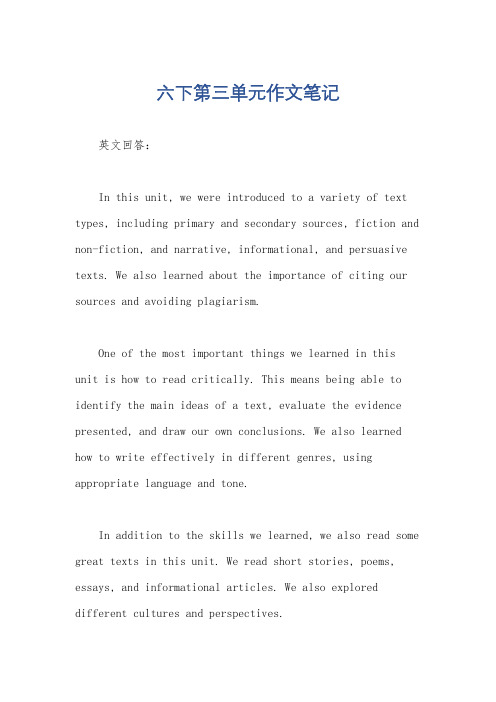
六下第三单元作文笔记英文回答:In this unit, we were introduced to a variety of text types, including primary and secondary sources, fiction and non-fiction, and narrative, informational, and persuasive texts. We also learned about the importance of citing our sources and avoiding plagiarism.One of the most important things we learned in thisunit is how to read critically. This means being able to identify the main ideas of a text, evaluate the evidence presented, and draw our own conclusions. We also learned how to write effectively in different genres, using appropriate language and tone.In addition to the skills we learned, we also read some great texts in this unit. We read short stories, poems, essays, and informational articles. We also explored different cultures and perspectives.Overall, this unit was a great learning experience. I feel more confident in my ability to read and write effectively. I am also more aware of the world around me and the different perspectives that people have.中文回答:本单元我们学习了多种文本类型,包括一手和二手资料、虚构和非虚构文本,以及叙述、信息和说明文。
六年级下册英语第三单元笔记
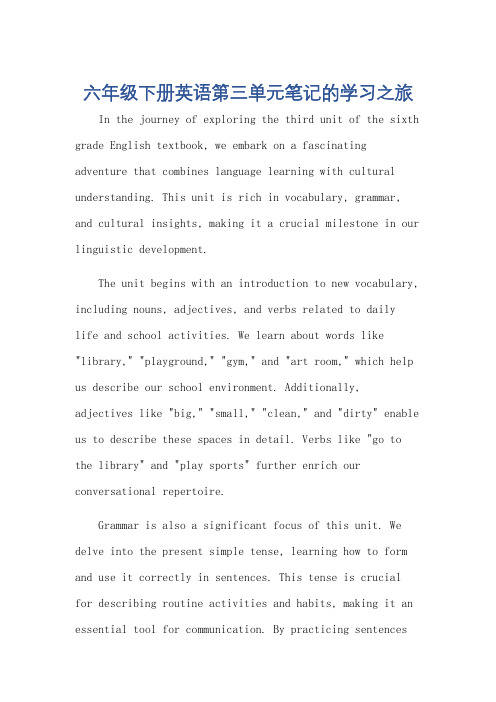
六年级下册英语第三单元笔记的学习之旅 In the journey of exploring the third unit of the sixth grade English textbook, we embark on a fascinating adventure that combines language learning with cultural understanding. This unit is rich in vocabulary, grammar, and cultural insights, making it a crucial milestone in our linguistic development.The unit begins with an introduction to new vocabulary, including nouns, adjectives, and verbs related to dailylife and school activities. We learn about words like "library," "playground," "gym," and "art room," which help us describe our school environment. Additionally, adjectives like "big," "small," "clean," and "dirty" enable us to describe these spaces in detail. Verbs like "go to the library" and "play sports" further enrich our conversational repertoire.Grammar is also a significant focus of this unit. We delve into the present simple tense, learning how to form and use it correctly in sentences. This tense is crucialfor describing routine activities and habits, making it an essential tool for communication. By practicing sentenceslike "I go to school every day" and "She plays the piano on Sundays," we solidify our understanding of this tense.Beyond vocabulary and grammar, the unit also introduces us to cultural elements of school life in English-speaking countries. We learn about the importance of extracurricular activities, such as sports and arts, in the overall development of students. This cultural insight helps us appreciate the differences and similarities between our own school systems and those in other countries.To consolidate our learning, the unit includes various activities and exercises. We practice reading comprehension skills by reading and answering questions about school life in an English-speaking country. Writing exercises challenge us to use the new vocabulary and grammar we have learned to describe our own school environment. Role-playingactivities also help us apply our language skills in a fun and interactive way.The journey doesn't end here. We continue to explore and learn through supplementary materials and online resources, expanding our knowledge and understanding of the topic. By engaging with a range of learning tools, wedeepen our understanding of the language and culture presented in the unit.Overall, the third unit of the sixth grade English textbook is a rich and rewarding learning experience. It combines language skills with cultural understanding, providing us with a comprehensive understanding of schoollife in an English-speaking context. Through this unit, we not only improve our English proficiency but also gain a deeper appreciation for the diverse school systems aroundthe world.**六年级下册英语第三单元笔记的学习之旅**在探索六年级英语下册第三单元的过程中,我们踏上了一段令人着迷的学习之旅,将语言学习与文化理解相结合。
外研版六年级下册英语笔记

外研版六年级下册英语笔记In this article, I will provide a comprehensive summary of the English textbook "Experiencing English" for Grade 6, published by Foreign Language Teaching and Research Press. This textbook is designed to enhance students' English language skills and help them develop a solid foundation in English grammar, vocabulary, reading, writing, listening, and speaking. Throughout the textbook, students will engage in various activities and exercises that promote active learning and meaningful interaction in English.The textbook is divided into 10 units, each focusing on different themes and language skills. Unit 1, titled "Welcome to Our School," introduces students to the school environment and helps them familiarize themselves with common school vocabulary and expressions. The unit includes reading passages, comprehension questions, vocabulary exercises, and speaking activities. Students will learn how to introduce themselves, describe their school, and talk about their daily routines.Unit 2, titled "Our Hobbies," explores different hobbies and interests. Students will learn how to express their likes and dislikes, talk about their favorite activities, and ask questions about others' hobbies. The unit includes listening exercises, role-plays, and group discussions to encourage students' active participation and improve their listening and speaking skills.Unit 3, titled "Our Family," focuses on family relationships and introduces students to vocabulary related to family members, daily routines, and household chores. Students will learn how to describe their family members, talk about their relationships, and discuss their responsibilities at home. The unit includes reading passages, grammar exercises, and writing tasks to enhance students' reading and writing abilities.Unit 4, titled "Our Community," explores different places in the community, such as the library, post office, and supermarket. Students will learn how to give directions, ask for information, and talk about their favorite places in the community. The unit includeslistening activities, role-plays, and group projects to improve students' listening and speaking skills and promote their creativity and teamwork.Unit 5, titled "Our Daily Life," focuses on daily activities and routines. Students will learn how to talk about their daily schedule, describe their activities, and discuss time expressions. The unit includes reading passages, vocabulary exercises, and speaking tasks to enhance students' reading comprehension and speaking abilities.Unit 6, titled "Our Food," introduces students to different types of food and healthy eating habits. Students will learn how to talk about their favorite food, express their preferences, and discuss the importance of a balanced diet. The unit includes listening exercises, role-plays, and group discussions to improve students' listening and speaking skills and raise their awareness of healthy eating.Unit 7, titled "Our Festivals," explores different festivals and celebrations around the world. Students will learn about cultural traditions, customs, and holiday activities. They will also learn how to talk about their favorite festivals, describe traditional food and activities, and share their holiday experiences. The unit includes reading passages, grammar exercises, and writing tasks to enhance students' reading and writing abilities.Unit 8, titled "Our Environment," focuses on environmental issues and encourages students to take actions to protect the environment. Students will learn vocabulary related to environmental problems, such as pollution and deforestation, and discuss possible solutions. The unit includes listening activities, role-plays, and group projects to improve students' listening and speaking skills and raise their environmental awareness.Unit 9, titled "Our World," introduces students to different countries, cultures, and landmarks around the world. Students will learn how to talk about different countries, describe famous landmarks, and discuss cultural similarities and differences. The unit includes reading passages, vocabulary exercises, and speaking tasks to enhance students' reading comprehension and speaking abilities.Unit 10, titled "Our Dreams," encourages students to dream big and set goals for themselves. Students will learn how to talk about their dreams, express their ambitions,and discuss their future plans. The unit includes listening exercises, role-plays, and group discussions to improve students' listening and speaking skills and inspire their creativity and determination.In conclusion, the English textbook "Experiencing English" for Grade 6 provides a comprehensive and engaging curriculum for students to develop their English language skills. With its diverse range of topics, interactive activities, and focus on all language skills, this textbook aims to cultivate students' interest in English learning and help them become confident and proficient English speakers.。
六年级下册英语第3单元重点知识总结

六年级下册英语第3单元重点知识总结全文共3篇示例,供读者参考篇1Unit 3 in the sixth grade English textbook covers a variety of important topics for students to learn and understand. In this unit, students will learn about the past tense, including regular verbs and irregular verbs, as well as adverbs of frequency, and how to talk about daily routines and hobbies. This unit is crucial for students to grasp as it will help them in their day-to-day conversations and writing skills.One of the key points in this unit is the past tense. Students will learn how to form regular past tense verbs by adding -ed to the base form of the verb. For example, the verb "play" in the past tense becomes "played." Irregular verbs, however, do not follow this rule and students must memorize the past tense forms of these verbs. Examples of irregular verbs include "go" which becomes "went" in the past tense.Another important aspect of this unit is adverbs of frequency. Students will learn how to use adverbs like "always," "often," "sometimes," "rarely," and "never" to talk about how often theydo certain activities. For example, "I always brush my teeth before bed" or "I rarely eat fast food."Furthermore, students will learn how to talk about their daily routines and hobbies using the past tense and adverbs of frequency. For example, students can say "I usually watch TV in the evening, but last night I read a book instead" to talk about their daily routine.Overall, Unit 3 is a crucial part of the sixth-grade curriculum as it teaches students important grammar points and vocabulary that will help them communicate effectively in English. By mastering the past tense, adverbs of frequency, and how to talk about daily routines and hobbies, students will be better equipped to handle conversations and written assignments in English. It is important for teachers to reinforce these concepts through practice exercises and activities to help students fully grasp the material.篇2Unit 3 in the sixth grade English textbook covers a variety of key concepts and skills that students will need to master. Let's summarize the main points and highlight the important vocabulary, grammar, and language structures from this unit.Vocabulary:1. Weather: sunny, windy, cloudy, rainy, snowy, stormy2. Seasons: spring, summer, autumn/fall, winter3. Activities: skiing, skating, sledding, playing baseball, swimming4. Clothing: coat, sweater, boots, gloves, scarfGrammar:1. Present continuous tense: This tense is used to talk about actions happening now or around now. It is formed using the present simple of "to be" (am/is/are) + the base form of the verb + -ing.Example: "She is playing baseball with her friends."2. Comparative adjectives: Comparative adjectives are used to compare two things. They are usually formed by adding -er to one-syllable adjectives and using "more" with longer adjectives.Example: "Winter is colder than spring."3. Superlative adjectives: Superlative adjectives are used to compare more than two things and show which is the most or least.Example: "Summer is the hottest season."Language structures:1. How's the weather today?- It's sunny/windy/cloudy/rainy/snowy/stormy.2. What's the weather like inspring/summer/autumn/winter?- It's warm/hot/cold/cool.3. What are you doing?- I'm skiing/skating/sledding/playing baseball/swimming.4. I like winter the best because...- It's cold and I can go skiing.By mastering the vocabulary, grammar, and language structures from Unit 3, students will be able to communicate effectively about the weather, seasons, activities, and preferences. These skills will help them develop their English language proficiency and build a strong foundation for future learning.篇3Grade 6 Unit 3 English Knowledge SummaryUnit 3 of the sixth grade English textbook covers a variety of topics, from daily routines and household chores to expressing preferences and giving instructions. In this unit, students will learn vocabulary related to daily activities, use of imperative verbs, and expressing likes and dislikes. Below is a summary of the key knowledge points in Unit 3.Vocabulary:1. Daily Activities: words such as wake up, brush teeth, have breakfast, go to school, do homework, and go to bed.2. Household Chores: clean the room, do the dishes, take out the trash, sweep the floor, and water the plants.3. Expressing Preferences: I like, I prefer, I love, I enjoy, I don't like, I hate, etc.4. Giving Instructions: imperatives (e.g. Open the window, Turn off the lights, Feed the cat) and sequencing words (First, Next, Then, Finally).Grammar:1. Imperative Verbs: using verbs in their base form to give commands or instructions (e.g. Eat your vegetables, Clean your room).2. Present Simple Tense: talking about daily routines (e.g. She brushes her teeth every morning, He goes to bed at 9o'clock).Speaking Skills:1. Expressing Likes and Dislikes: using adjectives and phrases to talk about preferences (e.g. I like watching TV, He hates doing homework).2. Giving Instructions: using imperatives to tell someone how to do something (e.g. Open the book, Write your name).Writing Skills:1. Sequencing: using transition words to organize ideas in a logical order (e.g. First, Then, Next, Finally).2. Descriptive Writing: using adjectives to describe daily activities and household chores (e.g. The room is clean and tidy, She washes the dishes carefully).Listening Skills:1. Following Instructions: listening to a series of commands and performing the actions accordingly.2. Identifying Likes and Dislikes: listening to statements about preferences and matching them with the correct person.Reading Comprehension:1. Identifying Key Information: understanding the main ideas and details in texts about daily routines and household chores.2. Making Inferences: drawing conclusions based on the information given in a text, such as inferring a person's preferences or habits.Overall, Unit 3 focuses on developing students' abilities to talk about daily activities, express preferences, give instructions, and understand others' likes and dislikes. By mastering the vocabulary, grammar, speaking, writing, listening, and reading skills outlined in this unit, students will be well-equipped to communicate effectively in English in a variety of situations related to daily life.。
外研版英语六年级下册Module 3词汇详解课件
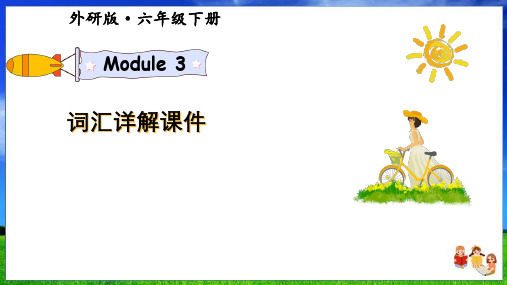
【例句】There are some cows on the farm. 农场里有一些奶牛。
【联想】pig 猪 dog 狗 duck 鸭子 sheep 绵羊
【联想记忆】cow
milk
奶牛
牛奶
学法指导 2022版义务教育新课标要求学生有更多 的词汇储存,要重视学生要扩大词汇量,掌 握词汇在不同情境中的用法,因此,讲解词 汇重点句型时,要结合例句,让学生去体会 其一词多义,发展学生的语言思维和运用能 力。同时,多表扬、勤鼓励,使不同层次的 学生都有学习积极性,在知识上均有所提高, 提高英语学习核心素养。
且请看看这只鸟。 【其他词义】刚才,方才;正好;只是
词汇详解
v.(动词) 吹,刮
【发音】ow 发
【短语】blow out 吹灭
【例句】The wind is blowing. 风正在吹。
【变换字母记忆】
slow s改为b 慢的
blow 吹,刮
词汇详解
n.(名词) 奶牛
【发音】ow 发
【形近词】now 现在 how 如何,怎样
外研版·六年级下册
Module 3
词汇详解课件
词汇详解
v.(动词)哭
【发音】y 发 【第三人称单数形式】cries 【动词-ing形式】crying 【过去式】cried 【形近词】try 试,尝试 dry 干的 【例句】My brother is crying.
我弟弟正在哭。 【对比记忆】 cry哭 laugh笑
词汇详解
v.(动词) (太阳)发光,
照耀
【发音】i 发
【第三人称单数形式】shines
【动词-ing形式】shining
【过去式】shined/shone
六年级下册英语单元知识梳理-Unit 3 Mary's diary Join in外研剑桥

Unit 3 Television Words:diary 日记difficult 困难的flavour味道gentleman先生guide导游horrible可怕的lady女士rope绳索saying格言,谚语share分享show娱乐表演strawberry草莓tour参观,游览vanilla香草精beautiful美丽的hometown家乡castle城堡first第一的ghost 鬼魂tower塔funny有趣的excellent卓越的Scotland苏格兰Phrases:live in 居住keep a diary写日记be difficult for对…来说是难的be good at擅长work harder努力工作be going to将要做某事have a great time玩得开心come out 出来listen to music 听音乐go riding/fishing/swimming 去骑车/钓鱼/游泳do maths exercises 做数学练习read阅读play football踢足球watch TV 看电视play table tennis打乒乓球paint 涂色Sentences:1. Keep a diary, and someday it’ll keep you.记日记吧,总有一天它会记下你的一生。
2. I keep a diary every day.我每天都写日记。
3. I like reading and writing. 我喜欢阅读和写作。
4. Mr Brown gave us five sums to do .布朗先生给了我们五道算术题做。
5. I will work harder.我要更努力地学习。
6. I don’t think it is true.我认为那不是真的。
7. It was so funny.太有趣了。
8. This castle is 800 years old.这座城堡有800年的历史了。
2014年外研版六年级下册Module3知识点及练习
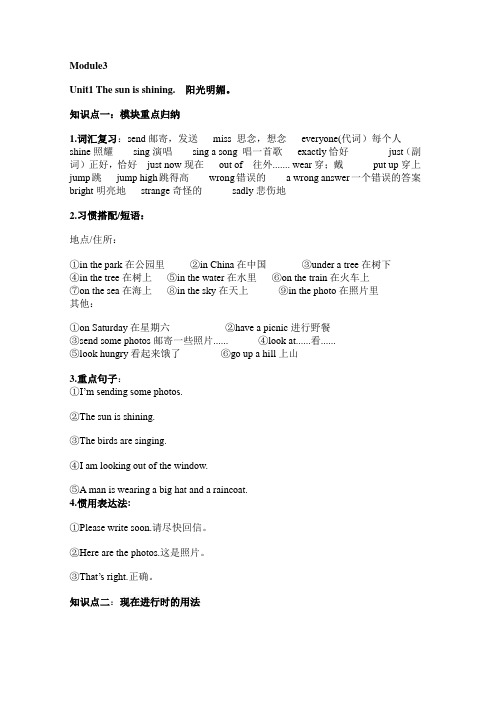
Module3Unit1 The sun is shining. 阳光明媚。
知识点一:模块重点归纳1.词汇复习:send邮寄,发送miss 思念,想念everyone(代词)每个人shine照耀sing演唱sing a song 唱一首歌exactly恰好just(副词)正好,恰好just now现在out of往外....... wear穿;戴put up穿上jump跳jump high跳得高wrong错误的 a wrong answer一个错误的答案bright明亮地strange奇怪的sadly悲伤地2.习惯搭配/短语:地点/住所:①in the park在公园里②in China在中国③under a tree在树下④in the tree在树上⑤in the water在水里⑥on the train在火车上⑦on the sea在海上⑧in the sky在天上⑨in the photo在照片里其他:①on Saturday在星期六②have a picnic进行野餐③send some photos邮寄一些照片...... ④look at......看......⑤look hungry看起来饿了⑥go up a hill上山3.重点句子:①I’m sending some photos.②The sun is shining.③The birds are singing.④I am looking out of the window.⑤A man is wearing a big hat and a raincoat.4.惯用表达法:①Please write soon.请尽快回信。
②Here are the photos.这是照片。
③That’s right.正确。
知识点二:现在进行时的用法1.定义:现在进行时表示现在正在进行或发生的动作,也可表示当前一段时间内的活动或现阶段正在进行的动作。
【精选】外研版六年级下册英语Module 3重要知识点总结

【精选】外研版六年级下册英语Module 3重要知识点总结重点词汇cry 哭cow 奶牛shine(太阳) 发光, 照耀everyone 人人, 每人;大家just 就, 且请blow 吹, 刮rabbit 兔子重点短语fly away 飞走write to me 写信给我start to rain 开始下雨play hide-and-seek 玩捉迷藏look out of 向……外看in the tree 在树上in this photo 在这张照片中in the mountains 在山里in the water 在水里the middle of the night 半夜重点句型1 In this photo, the sun is shining. 在这张照片中, 阳光灿烂。
解读: 当描述照片或图片中某人/ 某物正在做某件事情时, 用现在进行时。
描述照片或图片中的某人或某物正在做某事的句型:In this photo/picture, 主语(第三人称单数) + is + 动词的-ing 形式(+ 其他) .2 —What are you doing, Simon? 你正在干什么, 西蒙?—I’m cleaning my room. 我正在打扫我的房间。
解读: 问句是由what 引导的现在进行时的特殊疑问句, 用来询问某人正在做什么。
答语表示某人正在做某事。
询问某人正在做什么及其回答的句型:—What + be 动词+ 主语+ doing?—主语+ be 动词+ 动词的-ing 形式(+ 其他) .现在进行时的用法小结:肯定句: 主语+ be 动词(am, is, are) + 动词的-ing 形式(+ 其他) .否定句: 主语+ be 动词(am, is, are) + not + 动词的-ing 形式(+ 其他) .一般疑问句: Be 动词(Am, Is, Are) + 主语+ 动词的-ing 形式(+ 其他) ?特殊疑问句: 特殊疑问词+ be 动词(am, is, are) + 主语+ 动词的-ing 形式?1/ 1。
- 1、下载文档前请自行甄别文档内容的完整性,平台不提供额外的编辑、内容补充、找答案等附加服务。
- 2、"仅部分预览"的文档,不可在线预览部分如存在完整性等问题,可反馈申请退款(可完整预览的文档不适用该条件!)。
- 3、如文档侵犯您的权益,请联系客服反馈,我们会尽快为您处理(人工客服工作时间:9:00-18:30)。
第一部分:Lesson One
1. 课文标题:What do you do on Sundays?
2. 课文内容概要:Jack's d本人ly routine on Sundays.
3. 重点词汇:Sunday, breakfast, watch, TV, go, supermarket.
4. 课文难点:陈述句的肯定和否定形式。
5. 学习重点:了解Jack的周日活动,能够用英语描述自己的周日活动。
6. 课文细节:Jack在周日早上吃早餐,上午看电视,下午去超市。
他
喜欢周日。
第二部分:Lesson Two
1. 课文标题:What's your favourite day?
2. 课文内容概要:同学们喜欢的日子。
3. 重点词汇:favourite, day, Monday, my favourite day is…。
4. 课文难点:询问和回答喜欢的日子。
5. 学习重点:了解同学们喜欢的日子,能够用英语表达自己喜欢的日子。
6. 课文细节:同学们喜欢不同的日子,有的喜欢周一,有的喜欢周五,有的喜欢周日。
第三部分:Lesson Three
1. 课文标题:I go to school by bike.
2. 课文内容概要:同学们上学的方式。
3. 重点词汇:by, bus, bike, foot.
4. 课文难点:介词by的用法。
5. 学习重点:了解同学们上学的方式,能够用英语表达自己上学的方式。
6. 课文细节:有的同学坐公交车上学,有的同学骑自行车上学,还有
的同学步行上学。
第四部分:Lesson Four
1. 课文标题:How do you go to the zoo?
2. 课文内容概要:同学们去动物园的方式。
3. 重点词汇:zoo, how, go, there.
4. 课文难点:疑问词how的用法。
5. 学习重点:了解同学们去动物园的方式,能够用英语表达自己去动物园的方式。
6. 课文细节:同学们去动物园的方式有很多种,有的坐公交车,有的骑自行车,有的坐地铁。
第五部分:Lesson Five
1. 课文标题:Where is it?
2. 课文内容概要:同学们家附近的地点。
3. 重点词汇:where, supermarket, park, library, cinema.
4. 课文难点:询问和回答地点位置。
5. 学习重点:了解同学们家附近的地点,能够用英语询问和回答地点位置。
6. 课文细节:同学们家附近有超市、公园、图书馆和电影院等地方,他们可以步行到这些地方。
结束语:通过学习本单元的课文,我们不仅能掌握日常活动和交通方式的英语表达,还能了解同学们喜欢的日子和家附近的地点。
希望同学们能够在课后多加练习,提高自己的英语口语表达能力。
